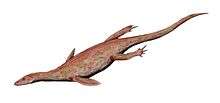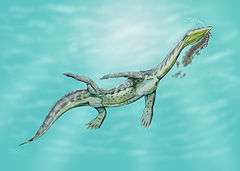Nothosaur
Nothosaurs (order Nothosauroidea) were Triassic marine sauropterygian reptiles that may have lived like seals of today, catching food in water but coming ashore on rocks and beaches. They averaged about 3 metres (10 ft) in length, with a long body and tail. The feet were paddle-like, and are known to have been webbed in life, to help power the animal when swimming.[1] The neck was quite long, and the head was elongated and flattened, and relatively small in relation to the body. The margins of the long jaws were equipped with numerous sharp outward-pointing teeth, indicating a diet of fish and squid.
| Nothosaur Temporal range: Triassic | |
|---|---|
 | |
| Nothosaurus | |
| Scientific classification | |
| Kingdom: | Animalia |
| Phylum: | Chordata |
| Class: | Reptilia |
| Superorder: | †Sauropterygia |
| Clade: | †Eosauropterygia |
| Order: | †Nothosauroidea Baur, 1889 |
| Subgroups | |
| |
Taxonomy
The Nothosauroidea consist of two suborders:
- Pachypleurosauria, small primitive forms, and
- Nothosauria (including two families Nothosauridae and Simosauridae), which evolved from pachypleurosaurs.
The placement of pachypleurosaurs within Nothosauroidea is uncertain, as several analyses recover it as basal to Eusauropterygia, e.i. the clade formed by Nothosauria and Pistosauroidea, instead as the sister taxon of Nothosauria.[2] However, most analyses still reinforce the traditional hypothesis of the sister taxon relationship between Pachypleurosauria and Nothosauria.[3][4]
Nothosaur-like reptiles were in turn ancestral to the more completely marine plesiosaurs, which replaced them at the end of the Triassic period.
References
- Palmer, D., ed. (1999). The Marshall Illustrated Encyclopedia of Dinosaurs and Prehistoric Animals. London: Marshall Editions. p. 72. ISBN 978-1-84028-152-1.
- Olivier Rieppel (1999). "The sauropterygian genera Chinchenia, Kwangsisaurus, and Sanchiaosaurus from the Lower and Middle Triassic of China". Journal of Vertebrate Paleontology. 19 (2): 321–337. doi:10.1080/02724634.1999.10011144.
- Neenan, J. M.; Klein, N.; Scheyer, T. M. (2013). "European origin of placodont marine reptiles and the evolution of crushing dentition in Placodontia". Nature Communications. 4: 1621. Bibcode:2013NatCo...4.1621N. doi:10.1038/ncomms2633. PMID 23535642.
- Da-Yong Jiang; Ryosuke Motani; Andrea Tintori; Olivier Rieppel; Guan-Bao Chen; Jian-Dong Huang; Rong Zhang; Zuo-Yu Sun; Cheng Ji (2014). "The Early Triassic eosauropterygian Majiashanosaurus discocoracoidis, gen. et sp. nov. (Reptilia, Sauropterygia), from Chaohu, Anhui Province, People's Republic of China". Journal of Vertebrate Paleontology. 34 (5): 1044–1052. doi:10.1080/02724634.2014.846264.
Sources
- Johnson, Jinny (2000). Fantastic Facts About Dinosaurs. ISBN 978-0-7525-3166-3.
- Benton, M. J. (2004), Vertebrate Paleontology, 3rd ed. Blackwell Science Ltd classification
- Colbert, E. H., (1969), Evolution of the Vertebrates, John Wiley & Sons Inc (2nd ed.)
- Rieppel, O., (2000), Sauropterygia I, placodontia, pachypleurosauria, nothosauroidea, pistosauroidea: In: Handbuch der Palaoherpetologie, part 12A, 134pp. Verlag Dr. Friedrich Pfeil Table of contents

